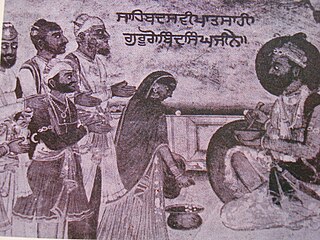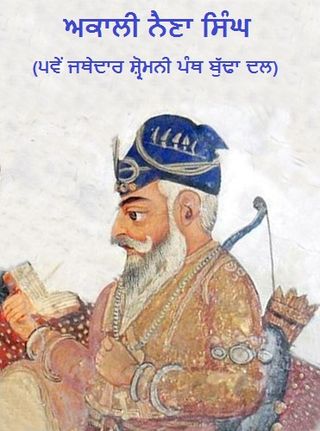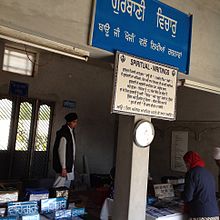
The Sarbloh Granth or Sarabloh Granth, also called Manglacharan Puran or Sri Manglacharan Ji, is a voluminous scripture, composed of more than 6,500 poetic stanzas. It is traditionally attributed as being the work of Guru Gobind Singh, the tenth Sikh guru. Scholars, on the other hand, attribute the work to after the Guru's death, being authored by an unknown poet. The work is mostly revered by the Nihang sect.
Sahib Singh was one of the Panj Pyare. He was formerly known as Sahib Chand and was born into the Nai caste before being baptized into Khalsa tradition.

Mata Sahib Devan, also known as Mata Sahib Kaur, was a wife of Guru Gobind Singh.

Mātā Jīto, or Ajeet Kaur, was a wife of Guru Gobind Singh.
Burj Ran Singh, also spelled as Burj Ran Singh Wala, is a village in the Chunian Tehsil of Kasur District in West Punjab (Pakistan). It is named after third Chief of Nakai Misl Sardar Ran Singh Nakai.
Karnail Singh Paras was a Shiromani Kavishar award-winning Kavishar of Indian Punjab. He is the father of former union minister and Samajwadi Party politician Balwant Singh Ramoowalia and Canada based writer Iqbal Singh Ramoowalia. One of his granddaughters is married to famous Punjabi singer and actor Harbhajan Maan.
Chakar is a village in the Jagraon tehsil of Ludhiana district in Indian Punjab. It is located on the Guru Gobind Singh Marg. The sixth Sikh guru, Guru Hargobind Sahib visited this place in 1631 during his tour of Malwa region and the tenth master, Guru Gobind Singh in 1705 after the battle of Chamkaur Sahib

Khalsa Mahima is the name of two compositions that praise the Khalsa in poetic form, composed by Guru Gobind Singh, each present in Dasam Granth and Sarbloh Granth.

Lal Singh Dil was one of the major revolutionary Punjabi poets emerging out of the Naxalite (Marxist-Leninist) Movement in the Indian Punjab towards the late sixties of the 20th century. The Movement was a political failure and died down quickly, but it brought in revolutionary changes in the subject matter, language and idiom, tone and tenor of Punjabi poetry. Referring to the impact of the Naxalite Movement in Punjab, sociologist Paramjit S. Judge says, "The consequences of the Naxalite movement have been almost ephemeral and have hardly made an impact on the social and political spheres... Its positive contribution is that it has revolutionized Punjabi poetry which can never be traditional and romantic again." "The prominent poets belonging to this school are: Pash, Lal Singh Dil, Harbhajan Halvarvi, Darshan Khatkar, Amarjit Chandan and Sant Ram Udasi," says Paramjit S Judge. Prof Ronki Ram called him "one of the most popular and serious poets of the Naxal Movement in Punjab of the late 1960s."

The History of Dasam Granth is related to the time of creation and compilation of various writings by Guru Gobind Singh in form of small booklets, some of which are Sikh prayers. Some writings are in question as the guru did not compile the book himself. Some material was added after his demise and this is evident in the writing style and in content. After 1708, a combined form of those booklets, the present-day granth or single volume, was compiled by Mani Singh Khalsa, contributed by other Khalsa armymen under direct instructions of Mata Sundari and this volume is recognized as Sri Dasam Granth Sahib. Present day Dasam Granth includes Jaap Sahib, Akal Ustat, Bachitar Natak, Chandi Charitar Ukati Bilas, Chandi Charitar II, Chandi di Var, Gyan Prabodh, Chaubis Avtar, Rudra Avtar, 33 Sawaiye, Khalsa Mahima, Shashtar Nam Mala Purana, Ath Pakh-yaan Charitar Likh-yatay and Zafarnamah.

Chaubis Avtar is a composition in Dasam Granth containing history of 24 incarnations (avatars) of Vishnu.
This is a list of works by Punjabi writer Bhai Vir Singh (1872–1957). This list includes his poetry, novels, translations, plays, and non-fiction.

Ramkali Sadh is a composition present in Guru Granth Sahib on ang 923/924, composed by Baba Sundar, in Ramkali Raga. The composition has 6 stanzas. Sadh literally means Call (ਸੱਦਾ). This narration tells Sikh attitude towards physical death of a Gurmukh. It also narrates events of succession of Gur Ram Das over Gur Amar Das.

Naina Singh, also known as Narayan Singh, was a Nihang warrior and fifth Jathedar of Budha Dal and a chief of the Shaheedan Misl during the late 18th century.
Padarath is used in Sikhism for a "step of spiritual Enlightenment." In the Guru Granth Sahib, the term padarath is used for temporal, as well as spiritual, attainments.

Bhattan de Savaiye, also known as Bhatt Bani, is a name given to 123 Savaiyas composed by various Bhatts, which are present in Guru Granth Sahib, scripture of Sikhs. According to various scholars, these Savaiyas are eulogies of first five Gurus of Sikhism.

The Nishanwalia Misl, also spelt as Nishananvali Misl, was a Sikh misl.

Giani Partap Singh was a Sikh priest and Panjabi writer. He served as the first acting Jathedar of Akal Takht from 19 December 1937 to 1948 and 19th Jathedar of Akal Takht from 1952 to 15 February 1955.
Lakhi Rai Bhatti was a ruler of Khairpur, in Bahawalpur, Pakistan. Later his state was captured by the Baloch tribes with the support of Ahmad Shah Abdali in 18th century. Raav is the Indian title for kings used in medieval India.

Baba Biram Das was born at Lakhnaur Sahib and is considered to be one of the greatest Udasi sants. His birth date is mentioned as 1636. However, the exact date of birth is not confirmed. His actual name was Ratan Das. He was son of Mata Gujri's paternal uncle Baba Biram Das had a very strong bond with Mata Gujri since they had spent their childhood together with each other. They were also the maternal uncle of Guru Gobind Singh. From childhood, Baba Biram Das was immensely engrossed in his devotion towards God.













